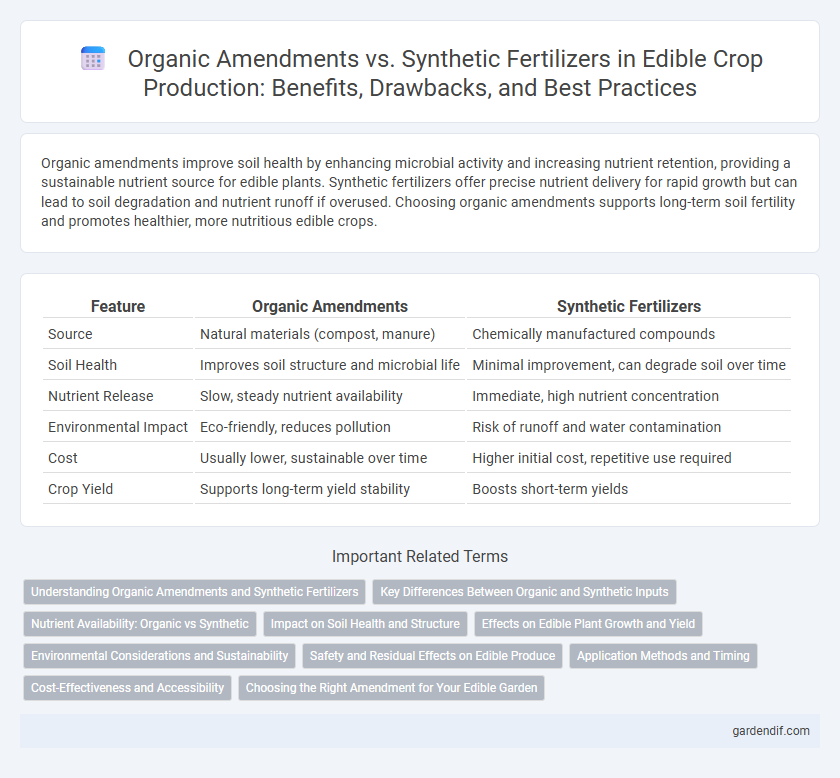
Organic Amendments vs Synthetic Fertilizers Illustration
Organic amendments improve soil health by enhancing microbial activity and increasing nutrient retention, providing a sustainable nutrient source for edible plants. Synthetic fertilizers offer precise nutrient delivery for rapid growth but can lead to soil degradation and nutrient runoff if overused. Choosing organic amendments supports long-term soil fertility and promotes healthier, more nutritious edible crops.
Table of Comparison
| Feature | Organic Amendments | Synthetic Fertilizers |
|---|---|---|
| Source | Natural materials (compost, manure) | Chemically manufactured compounds |
| Soil Health | Improves soil structure and microbial life | Minimal improvement, can degrade soil over time |
| Nutrient Release | Slow, steady nutrient availability | Immediate, high nutrient concentration |
| Environmental Impact | Eco-friendly, reduces pollution | Risk of runoff and water contamination |
| Cost | Usually lower, sustainable over time | Higher initial cost, repetitive use required |
| Crop Yield | Supports long-term yield stability | Boosts short-term yields |
Understanding Organic Amendments and Synthetic Fertilizers
Organic amendments enhance soil fertility by improving soil structure, increasing microbial activity, and providing slow-release nutrients derived from natural sources such as compost, manure, and plant residues. Synthetic fertilizers offer precise nutrient ratios like nitrogen, phosphorus, and potassium, delivering immediate nutrient availability to crops but may lead to soil degradation and reduced microbial diversity over time. Understanding the balance between organic amendments and synthetic fertilizers is crucial for sustainable agriculture, optimizing crop yield while maintaining soil health.
Key Differences Between Organic and Synthetic Inputs
Organic amendments release nutrients slowly, improving soil structure and microbial activity, while synthetic fertilizers provide immediate, concentrated nutrient availability for rapid plant growth. Organic inputs enhance long-term soil fertility through natural decomposition, whereas synthetic fertilizers primarily supply specific nutrients in precise ratios without contributing to soil biomass. Key differences include nutrient release rate, impact on soil health, and environmental sustainability, with organic amendments promoting ecological balance and synthetic fertilizers offering targeted nutrient delivery.
Nutrient Availability: Organic vs Synthetic
Organic amendments release nutrients gradually through microbial activity, enhancing long-term soil fertility and nutrient availability for edible crops. Synthetic fertilizers provide immediate nutrient availability, delivering precise nutrient ratios that support rapid plant growth but may lead to nutrient leaching over time. Balancing organic and synthetic inputs optimizes nutrient uptake and sustainable productivity in edible agriculture.
Impact on Soil Health and Structure
Organic amendments enhance soil health by improving microbial activity, increasing nutrient retention, and boosting soil structure through the addition of organic matter, which promotes aeration and water infiltration. Synthetic fertilizers can provide immediate nutrient availability but may degrade soil structure over time by reducing microbial diversity and causing soil compaction or salinization. Consistent use of organic matter-rich amendments supports long-term soil fertility and sustainable crop production compared to reliance on synthetic inputs.
Effects on Edible Plant Growth and Yield
Organic amendments enhance soil structure and microbial activity, promoting healthier root development and increased nutrient availability for edible plants. Synthetic fertilizers provide immediate nutrient supply, leading to rapid growth and higher initial yields but can cause soil degradation and reduced long-term productivity. Studies show that organic amendments improve crop resilience and edible yield quality, while synthetic fertilizers often result in higher short-term biomass but may compromise soil health over time.
Environmental Considerations and Sustainability
Organic amendments improve soil structure and enhance microbial activity, promoting long-term soil health and reducing environmental pollution. Synthetic fertilizers often lead to nutrient runoff and groundwater contamination, posing significant ecological risks. Sustainable agriculture benefits from organic inputs by minimizing carbon footprint and supporting biodiversity.
Safety and Residual Effects on Edible Produce
Organic amendments enhance soil health by releasing nutrients slowly, reducing the risk of harmful residue accumulation on edible produce, while synthetic fertilizers may lead to nutrient runoff and potential chemical residues that pose safety concerns. Studies show organic inputs lower heavy metal and pesticide residues in fruits and vegetables, promoting safer consumption. Persistent synthetic fertilizer use can result in residual nitrates and salts in crops, increasing health risks over time.
Application Methods and Timing
Organic amendments release nutrients gradually, improving soil structure and microbial activity, and are best applied well before planting to allow decomposition. Synthetic fertilizers provide precise nutrient delivery with rapid availability, suited for application during critical growth stages for immediate plant uptake. Timing and method selection optimize nutrient efficiency, reduce environmental impact, and support sustainable edible crop production.
Cost-Effectiveness and Accessibility
Organic amendments often present a more cost-effective solution for sustainable agriculture due to lower long-term expenses and improved soil health, which reduces the need for frequent applications. Synthetic fertilizers provide immediate nutrient availability but can incur higher cumulative costs over time due to environmental degradation and soil depletion. Accessibility varies regionally; organic materials can be locally sourced and renewable, whereas synthetic fertilizers rely on industrial production and distribution networks, affecting their availability and price stability.
Choosing the Right Amendment for Your Edible Garden
Organic amendments such as compost, manure, and bone meal improve soil structure and provide a slow release of nutrients, supporting long-term soil health in your edible garden. Synthetic fertilizers deliver precise nutrient ratios quickly, ideal for immediate growth but may risk nutrient buildup and soil degradation over time. Balancing organic amendments with targeted synthetic inputs ensures optimal nutrient availability and sustainable edible crop production.
Organic Amendments vs Synthetic Fertilizers Infographic

 gardendif.com
gardendif.com